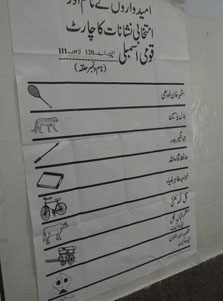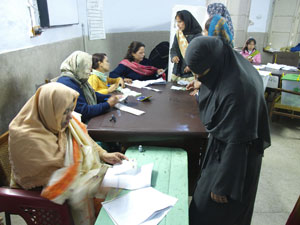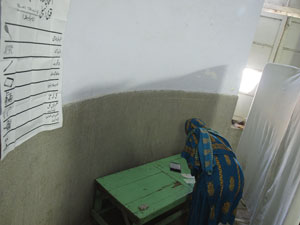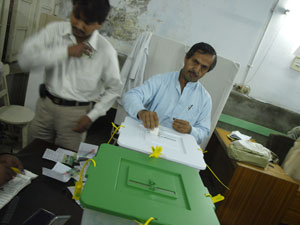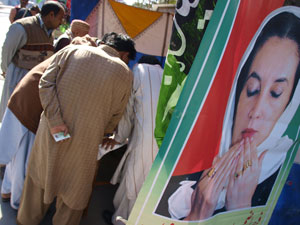February, 18th, 2008, Lahore, Pakistan:
February, 18th, 2008 Lahore: Pakistan-Along The Mall, Lahore's primary commercial strip, a cluster of curious traffic police stood watch upon the odd rickshaw and teenage cyclist. Normally choked with a riot of buzzing traffic, The Mall was eerily quiet as the polls opened this morning on the national and provincial elections that could budge the country's long stalled plebiscite. Negotiating into the gender-segregated polling place was quite easy but observing a "free and fair" voting process was a far more distant goal. It is likely that Lahore will be the most important of Pakistan's major urban centers being the capital of the nation's most populous, centralized province. The three principal parties contesting the vote in Punjab, the PML-N, the PPP, and the PML-Q, are represented by symbols on the ballot sheets to enable voter participation among semi-literate and illiterate people enabling a voting process without the voters needing to have been educated beforehand. This has traditionally been a very convenient arrangement for an electorate where literal vote buying is the norm. Nawaz Sharif's PML-N is represented by a tiger (although his supporters keep referring to him as the lion), Bhutto's PPP is represented by a tricolor arrow of red, black, and green while Musharraf's PML-Q is curiously a cartoonish bicycle. This morning, many Pakistanis were bussed to polling places by party apparatchiks who simply instructed them on who to cast their vote for. Here in Lahore, although there were officially eight parties running on the ballot, only party workers with voter registration rolls from the three major parties were present to check ballots against the printed lists. Ironically, at the first polling station we visited, the people working for the election commission did not have detailed voter rolls, while the party workers had fairly complete lists of exactly who was meant to turn up. The prospects for transparency immediately looked dim.
The strongest turn out in central Lahore appeared to be for the hometown hero, Mr. Sharif. To take a shallow dive in the complexity of Pakistan's disparate, feudal regionalisms, other parties not represented whatsoever in Lahore were hotly contesting Karachi and Peshawar. The Muttahida Qaumi Movement or MQM, which represents Pakistan's mohajirs, the millions of Urdu-speaking Muslims who migrated to Pakistan from across post-Partition India, was battling the PPP in Karachi while the Awami National League, a secularist, left-leaning, primarily Pashtun party was going against the PPP in Peshawar in the Northwest Frontier.
Mohammed Ashraf Hussein, director of Punjab province's Press Information Department told me that "the most crucial part of the election is Punjab" and that "who wins Punjab will control the National Assembly" meaning that Punjab carries the most seats in the National Assembly i.e. Parliament and whichever party wins the dense province will choose the country's next Prime Minister. When asked what he thought of Musharraf's man, Chaudry Pervaiz Elahi, running on the "bicycle" (PML-Q) ticket, he dryly replied "well Musharraf and Elahi are friends since long time and have been ruling together for the past five years" making it clear what he thought without actually stating that he was a PML-Q functionary. Elahi was the Chief Minister of Punjab and the President's favored choice the lead the nation lest they tire of him. When commenting on the relation to the voters and their parties, he explained that a minority of voters pick candidates based on a rational decision making and that the overwhelming majority voted for whomever, or whatever symbol for that matter, represented their regional, religious, or clan affiliations.
As the polls closed at dusk, horse carts and minibuses began to compete for space on roads that had been virtually deserted for most of the day. No one seemed to know exactly when the results would be announced as anxiety mounted. Asif Ali Zardari, Benazir Bhutto's notorious widower, stated that his PPP followers would spill into the streets if he deemed the elections to be rigged which would likely be any result in where they were not swept back into power. There is an old, rather condescending, expression regarding democracy on the subcontinent that goes something like "in America, people cast their vote, while in India, people vote their caste". In Pakistan, people vote their symbol and their symbol may simply usher in further discord if the nation's Big Men cannot accommodate one another in a civil, political arena. One hundred and sixty million people are waiting.
